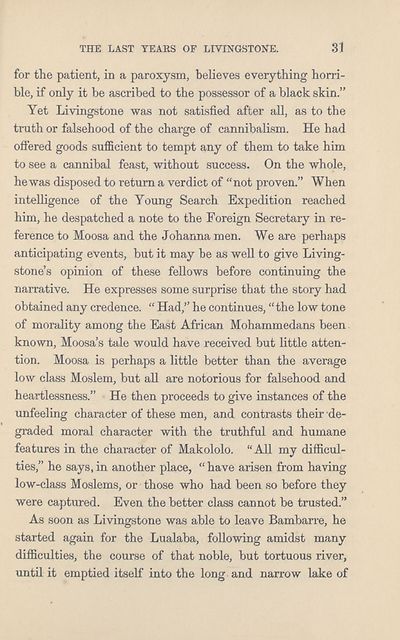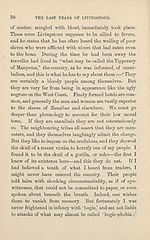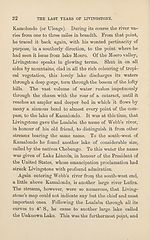Download files
Complete book:
Individual page:
Thumbnail gallery: Grid view | List view

THE LAST TEARS OF LIVINGSTONE.
31
for the patient, in a paroxysm, believes everything horri¬
ble, if only it be ascribed to the possessor of a black skin.”
Yet Livingstone was not satisfied after all, as to the
truth or falsehood of the charge of cannibalism. He had
offered goods sufficient to tempt any of them to take him
to see a cannibal feast, without success. On the whole,
he was disposed to return a verdict of “not proven.” When
intelligence of the Young Search Expedition reached
him, he despatched a note to the Foreign Secretary in re¬
ference to Moosa and the Johanna men. We are perhaps
anticipating events, but it may be as well to give Living¬
stone’s opinion of these fellows before continuing the
narrative. He expresses some surprise that the story had
obtained any credence. “ Had,” he continues, “the low tone
of morality among the East African Mohammedans been
known, Moosa’s tale would have received but little atten¬
tion. Moosa is perhaps a little better than the average
low class Moslem, but all are notorious for falsehood and
heartlessness.” He then proceeds to give instances of the
unfeeling character of these men, and contrasts their de¬
graded moral character with the truthful and humane
features in the character of Makololo. “All my difficul¬
ties,” he says, in another place, “ have arisen from having
low-class Moslems, or those who had been so before they
were captured. Even the better class cannot be trusted.”
As soon as Livingstone was able to leave Bambarre, he
started again for the Lualaba, following amidst many
difficulties, the course of that noble, but tortuous river,
until it emptied itself into the long and narrow lake of
31
for the patient, in a paroxysm, believes everything horri¬
ble, if only it be ascribed to the possessor of a black skin.”
Yet Livingstone was not satisfied after all, as to the
truth or falsehood of the charge of cannibalism. He had
offered goods sufficient to tempt any of them to take him
to see a cannibal feast, without success. On the whole,
he was disposed to return a verdict of “not proven.” When
intelligence of the Young Search Expedition reached
him, he despatched a note to the Foreign Secretary in re¬
ference to Moosa and the Johanna men. We are perhaps
anticipating events, but it may be as well to give Living¬
stone’s opinion of these fellows before continuing the
narrative. He expresses some surprise that the story had
obtained any credence. “ Had,” he continues, “the low tone
of morality among the East African Mohammedans been
known, Moosa’s tale would have received but little atten¬
tion. Moosa is perhaps a little better than the average
low class Moslem, but all are notorious for falsehood and
heartlessness.” He then proceeds to give instances of the
unfeeling character of these men, and contrasts their de¬
graded moral character with the truthful and humane
features in the character of Makololo. “All my difficul¬
ties,” he says, in another place, “ have arisen from having
low-class Moslems, or those who had been so before they
were captured. Even the better class cannot be trusted.”
As soon as Livingstone was able to leave Bambarre, he
started again for the Lualaba, following amidst many
difficulties, the course of that noble, but tortuous river,
until it emptied itself into the long and narrow lake of
Set display mode to:
![]() Universal Viewer |
Universal Viewer | ![]() Mirador |
Large image | Transcription
Mirador |
Large image | Transcription
| Antiquarian books of Scotland > Scotland/Scots > Last years of Livingstone > (39) |
|---|
| Permanent URL | https://digital.nls.uk/136057630 |
|---|
| Description | Thousands of printed books from the Antiquarian Books of Scotland collection which dates from 1641 to the 1980s. The collection consists of 14,800 books which were published in Scotland or have a Scottish connection, e.g. through the author, printer or owner. Subjects covered include sport, education, diseases, adventure, occupations, Jacobites, politics and religion. Among the 29 languages represented are English, Gaelic, Italian, French, Russian and Swedish. |
|---|

